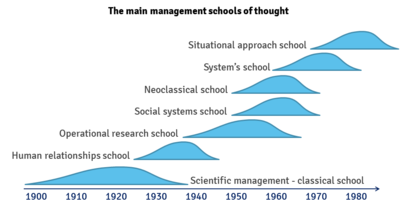Origin and development of the management science
| Origin and development of the management science |
|---|
| See also |
It is assumed that the beginning of the scientific management should be dated to the beginning of the twentieth century. Origin and development of the science of organization and management started with seminal publication of F.W. Taylor The principles of scientific management in 1914.
Years 1900-1930 - the scientific organization of work - Classical School
Representatives: FW Taylor, A. Smith, Ch. Babbage, H. Le Chatelier, Ch. Bedaux, F.B. Gilbreth, H. Fayol, K. Adamiecki, Z. Rytel, H.L. Gantt, H. Emerson, E. Hauswald, M. Weber.
Characteristics: the division of labour, observation and measurement, ordering process, solving practical problems of management, the creation of the scientific basis for management.
Achievements:
- Organizational cycle (LeChatelier), selection of goal, examination of conditions necessary to achieve the goal, the preparation of conditions and measures, the realization of a preconceived plan, control of the results),
- Measuring of work - Bedaux (economics of movements, classification of movements, allocation of tasks for small parts, time measurement, standardizing of work, job evaluation, remuneration),
- Fayol - management rules (division of labour, authority, discipline, unity of leadership, consistency, the subordination of personal interests to the public interest, remuneration, centralization,...).
Years 1930-1940 - Scientific organization - human relationships school
Representatives: E. Mayo, T. Bata, M.P. Follet, D.M. McGregor, R. Likert, K. Lewin.
Achievements:
- 1922 - Hawthorne Experiments - the influence of the atmosphere in the work performance of employees
- T. Bata - autonomous units - cooperation between business units based on the principles of free market
- 1930-1940 Mc Gregor - Theory Y Theory X (Theory X - man is inherently lazy and have an innate aversion to work. He has no ambition and is avoiding responsibility. Managers should use system of coercion, control and meticulous managing people, Theory Y - people mistreated at work, become such as are described by the theory of X. The nature of man is just as capable of work and commitment, as to have fun and relax. Under the right conditions, they want to be co-responsible for achieving the objectives of the organization)
Years 1940-1960 - School of operational research - World War II and Cold war
Representatives: P.M. Blackett, L.W. Kantorowicz, F.L. Hitchcock, G.B. Dantzig, R. Gomorrah, H.W. Kuhn, A.W. Tucker, R.E. Bellman
Achievements:
- reducing all kinds of management problems to quantitative aspects,
- use of mathematics - models, simulations, to optimize the managerial decision problem,
- transport network methods (PERT, CPM).
Years 1950-1960 - School of social systems
Representatives: Ch.I.Barnard, H.A.Simon, J.G.March, P. Selznick, A.W.Gouldner, A.Etzioni
Achievements: the principle of effective communication, decision-making phases (identification, design, selection, evaluation), rational system model, situational school. Theories of leadership. Balance in organization. Organizational ties...
Years 1950-1960 - Neoclassical school
Representatives: P.Drucker, A.Sloan, V.Pareto, H. Simon, AD Chandler
Achievements: a synthesis of the contribution of science to management, focused on practical problems, management by objectives, motivation by participation, cost centers, profit maximization, 20-80 principle, neoclassical concept of motivation (working conditions, employee participation in determining the tasks clearly defined goal and interesting work, an objective measurement of performance, the implementation of measures to stimulate the initiative, to promote proportional to the achieved results, the sanctions in case of failure, tolerance for failure)
Years 1960-1970 - The system's school
Representatives: L. von Bertalanffy, K.E. Boulding, R.A. Jonson, S. Beer, J.W Forrester, G. Nadler
Achievements: an attempt to synthesize the achievements of the earlier schools, the goals of the system, input and output streams, the ideal system, the system as a set of interdependent parts, the structure of the system as a set of non-accidental relationship between each parts in a coherent whole.
Years 1970-1980 - Situational approach
Representatives: R.J. Mockler, V.H. Voroom, P.R. Lawrence, J.W. Lorach, M. Crozier and E. Friedberg
Achievements: the establishment of relative management principles relating to the practical problems of a specific organization in a specific time and place, relativism and pragmatism, the emphasis on structural studies (multivariate analysis) and analysis of the interaction with the environment of organization
References
- Booth, C., & Rowlinson, M. (2006). Management and organizational history: prospects. Management & Organizational History, 1(1), 5-30.
- Lamond, D. (2005). On the value of management history: Absorbing the past to understand the present and inform the future. Management Decision, 43(10), 1273-1281.
- Wren, D. A. (2005). The history of management thought. John Wiley & Sons.
